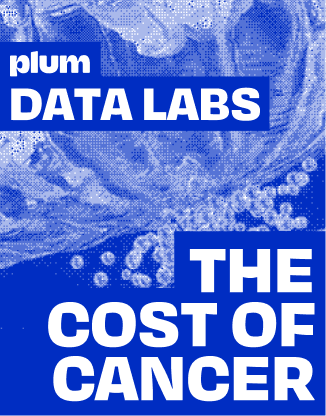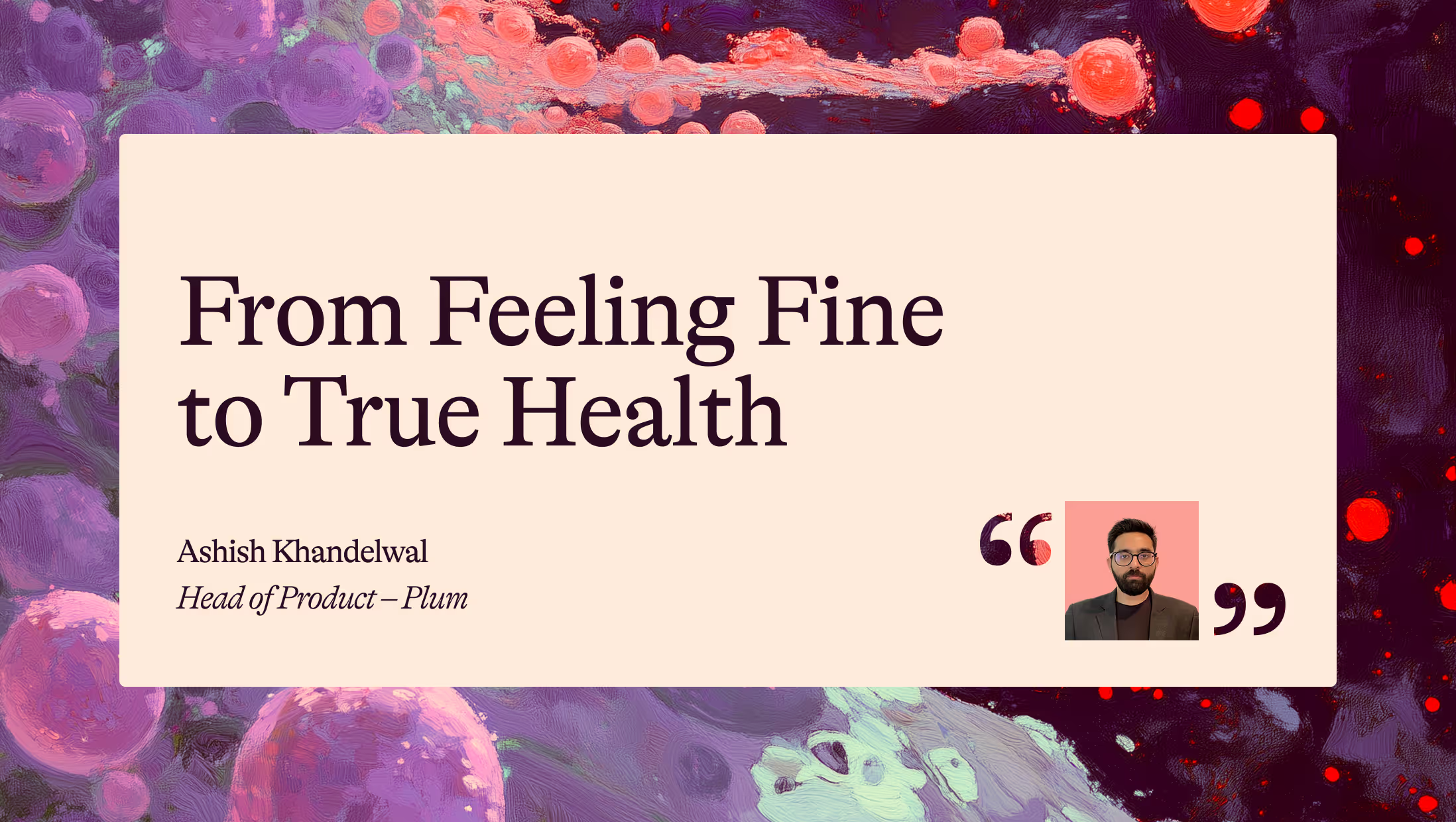Your latest health checkup came back "normal"—but are you really healthy?
We sat down with Dr. Anirudh Anilkumar, a physician specialising in acute illnesses, chronic diseases, and infectious disease management, to uncover the hidden gaps in standard diagnostic reports. With over a decade of clinical experience, Dr. Anilkumar has conducted clinical research across India and published internationally cited studies on COVID-19, HIV, and drug regimens. He recently presented his work at the Longevity India Conference at IISc-Bangalore, where he spoke about the future of proactive, personalised diagnostics.
In this conversation, Dr. Anilkumar shares the critical health risks that routine checkups consistently miss and what you can do to take control of your long-term health. Combining a holistic approach to care with deep public health insight, he shows us why “normal” test results may not be enough.
What do most people get in a standard health checkup, and what does "normal" really mean on these reports?
A standard medical checkup usually includes a complete blood count, liver function tests, kidney function tests, lipid profile, blood glucose, and a urine examination. Thyroid function tests and hormone panels are also commonly done.
But here's the thing about "normal"-- it's much harder to generalize than most people think. Labs unfortunately only have access to your test values at one point in time. Without personalization – knowing your medications, symptoms, comorbidities, or even your hydration status – it becomes very difficult to precisely say what's normal or not just by looking at biomarker values.
That's fascinating. Have you come across patients whose reports looked fine, but something serious was going on underneath? Could you share an example?
Absolutely. Often, patients aren't even aware of their health status, sometimes across generations. I've had multiple instances where young patients would get complete blood counts done that seemed normal, maybe suggestive of mild anaemia at worst. They typically wouldn't have done an HbA1c for diabetes screening, usually relying only on fasting glucose. I'd ask them to get an HbA1c test whenever they tested next, since it helps us understand long-term blood glucose levels better.
When they tried to get the HbA1c test done, it became apparent that they had genetic hemoglobinopathies – conditions that affect hemoglobin at a molecular level. Going purely based on their CBCs, they would have been unlikely to get diagnosed.
What about the opposite scenario, i.e., when tests look abnormal but patients are actually fine?
Great question! The opposite is also true, and it's becoming more common. Given the rise of over-the-counter supplementation, I've had numerous patients whose thyroid function tests seemed to suggest hypothyroidism. However, after taking a detailed history—since their symptoms weren't suggestive of hypothyroidism and the levels were too deranged for subclinical hypothyroidism—it became apparent they were consuming biotin supplements regularly.
Biotin, or Vitamin B7, interferes with some types of thyroid function tests, causing values to appear abnormal when patients are perfectly fine. This is another excellent example of why basing a diagnosis, let alone treatment, on lab tests alone is never a good idea.
What are some health risks or early warning signs that standard tests usually miss?
Most panels don't focus enough on preventive health, especially from a deficiency perspective. Here's a shocking statistic: despite nearly 1 in 2 Indian women and 1 in 4 Indian men being anemic, the cause is often falsely attributed to iron deficiency.
Large-scale national data from ICMR and NIN revealed that despite high prevalence, only 30% of anaemia was actually due to iron deficiency. Another 30% was due to B12 and B9 deficiencies predominantly, and the rest was due to unknown causes—likely autoimmune conditions, malabsorption, or helminth infestations.
This means iron panels, serum B12, B9, and Vitamin D levels are common tests with huge potential benefits, especially for women and vegetarian populations who are most at risk. Yet these are seldom part of most checkup packages.
Why are markers like inflammation, insulin resistance, or nutrient deficiencies often left out, despite their long-term impact?
The reason is two-fold. Until a decade or two ago, India was dealing with a massive infectious disease burden alongside metabolic diseases. Our priority from a health systems perspective was reactive medicine—what's described in public health as secondary prevention, which deals with prompt diagnosis and treatment.
Now that the infectious disease burden is decreasing to manageable levels through vaccinations, national programs, and better hygiene practices, we can give proactive medicine the attention it deserves. By using relatively novel biomarkers like inflammatory markers, insulin resistance indicators, and micronutrient levels, we can focus on primary and primordial prevention—screening for diseases before they present and eliminating risk factors.
There's also been a significant reduction in costs associated with these tests and national-level scaling up of testing capacity over the past decade, which is the second factor until now, preventing us from focusing on preventive health biomarkers.
Can you explain how something can go undetected in reports for years before it becomes a full-blown diagnosis?
Let me share a personal example. My father has had hypertension for nearly two decades, but it was only detected about a decade ago. The problem with metabolic diseases is that they don't present suddenly with loud fanfare—or a lot of red flags in test panels. They present insidiously.
Believe it or not, 'insidious' is actually a clinical term for when symptom presentations are gradual and subtle, spread out across time—though most people know it from horror movies!
For nearly a decade, we thought the slightly elevated serum creatinine we were seeing was just because he was eating a lot of non-vegetarian food. But thankfully, after getting insights during med school, we were able to get his hypertension diagnosed. At that point, it became clear that the elevated creatinine was indicative of early-stage chronic kidney disease.
And it's not just hypertension. Diabetes, dyslipidemia—all of these present as what might seem like negligible changes on reports. However, when taken together over time, they show a clear trend that helps identify disease patterns before they become chronic diseases. This is why testing from the same lab and testing regularly are key to identifying these patterns.
Find a list of medical and health terms you need to know here.
How has modern diagnostic science evolved, and how can people catch issues earlier than ever before?
The advancement has been remarkable. Nearly a decade before COVID-19, we had swine flu as a pandemic that resulted in travel restrictions and panic. All we had then was Tamiflu. Then in 2021—barely a year after COVID-19 was first isolated—we could order at-home tests on Amazon at affordable prices.
Today, lab tests mirror the advancements in diagnostics and clinical research, with assay sensitivity reaching nanograms or number of DNA copies per milliliter. Cutting-edge research from IIT-Bombay and HMS can detect biomarkers linked with neurodegenerative diseases years before symptoms potentially begin to manifest. Similar screening for cancers is being developed, with circulating tumor DNA detection reaching clinical viability in real-world settings.
If someone wants to go beyond the basics, what should they ask for in a more advanced health checkup?
I recently had the privilege of attending the Longevity India Conference at IISc-Bangalore, where a common theme emerged: focusing not just on lifespan, but healthspan—the duration of your life for which you're healthy. This concept focuses on the main causes of mortality and morbidity in the general population:
Cardiovascular Health: Go beyond just cholesterol. Look at Apo-B, hs-CRP, and ASCVD scores or similar calculators validated in Indian populations.
Cancer Screening: Especially if you have a family history, preemptive screening using blood tests is a good way to avoid more invasive methods. This includes tumor markers like CEA, CA-125, and CA-19.
Nutritional Deficiencies: Given how common chronic nutritional deficiencies are in the Indian population, checking whether you have deficiencies—spoiler alert, you most probably do—is the best way to acknowledge the problem. It also allows your doctor to determine whether oral or injection-based supplementation is more suitable. The most common deficiencies are iron, Vitamin D, B12, and B9.
Hormonal Health: Due to factors like obesity, microplastics, and unfortunate decisions—I once had a patient with hypothyroidism due to iodine deficiency because they switched from cheap, iodized salt to expensive, additive-free, organic, all-natural pink salt—human hormonal health is generally suboptimal. Thyroid, sex hormone, and Vitamin D levels are good ways to ensure your endocrine system is functioning well. This is especially relevant for athletes and professional sports players.
Chronic Disease Monitoring: If you're living with chronic disease, monitoring inflammatory markers, autoimmune markers, and disease-specific biomarkers is an excellent way to track prognosis. While only you can know how you feel, sometimes it helps to convey that to your healthcare provider through numbers, because we rarely can truly comprehend your lived experiences.
If you had to give one piece of advice to someone relying only on their annual report, what would you say?
Actually, I have five key pieces of advice:
First, test regularly, not frequently—unless you have a disease requiring frequent monitoring.
Second, try to test from the same lab each time. Different labs use different standards, units, and equipment, which can interfere with analyzing data over time.
Third, track your tests! Even just keeping your annual reports as PDFs in a Drive folder so you can share them with your doctor requires minimal effort—just drag and drop.
Fourth, when in doubt, find out! If only interpreting lab tests was as easy as looking at what was highlighted and ignoring everything else. Consult a healthcare provider to better understand your report, like through telemedicine platforms.
Finally, take your ChatGPT conversations with a pinch of iodized salt! AI in healthcare is transforming how we deliver care, but despite billions of dollars and the largest datasets on the planet, it's still more likely to make things up than your doctor. Use it to hold your healthcare provider accountable, and in a pinch, but never as a replacement. There's a reason for those disclaimers on AI chatbots!
Last question: For someone working in the Indian corporate sector, what should they look for in a comprehensive health solution?
You should experience first-hand what comprehensive healthcare looks like. If it were as easy as just insurance, healthcare companies would be teams of AI agents. But there's a reason successful health platforms are teams of tech professionals, healthcare providers, researchers, finance experts, designers, service executives, writers, and much more.
From helping you during moments of helplessness when the last thing on your mind is insurance approval, to wellness checks in your office, to accessing a doctor at 2 AM anywhere in the country—comprehensive healthcare covers everything. Teleconsultation for your pet, urgent care for your child, managing office stress, treating stubborn health issues, accessing quality supplements at discounts, genetic testing—a good platform has you covered even when traditional insurance might not.
The key is finding providers who keep building better experiences and tools to help you stay on top of your health, with a track record that speaks for itself.
.avif)










.avif)














